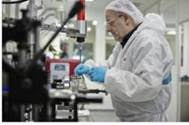 A range of new test systems that will help make trucks, buses and off-highway equipment cleaner and more fuel efficient has been installed by Delphi Automotive PLC at its Technical Centre in Gillingham (U.K.). Delphi’s state-of-the art research tools enhance the Gillingham Technical Centre’s position as one of the world’s leading development locations for clean diesel technologies.
A range of new test systems that will help make trucks, buses and off-highway equipment cleaner and more fuel efficient has been installed by Delphi Automotive PLC at its Technical Centre in Gillingham (U.K.). Delphi’s state-of-the art research tools enhance the Gillingham Technical Centre’s position as one of the world’s leading development locations for clean diesel technologies.
“Every major market around the world is introducing increasingly tough regulations that demand advanced fuel injection systems to help control emissions. These advanced new test facilities will help Delphi develop new generations of fuel injection technologies that allow commercial vehicle OEMs and engine manufacturers to meet these demanding requirements worldwide while continuing to enhance fuel economy and durability” explained Mr. John Fuerst , Vice President Engineering, Delphi Powertrain Systems.
New test systems for fast, efficient development
Delphi’s test laboratories at the Gillingham Technical Centre cover a wide range of activities for diesel engines from light duty to off highway applications from combustion research using a single cylinder engine to product development testing across a suite of twelve engine dynamometers. With 30 advanced performance test rigs and 60 durability test rigs, the site offers state-of-the-art capabilities. Recently implemented test system enhancements include upgrading 25 product validation machines, new metrology systems, substantial plant and infrastructure development and two significant new facilities: a state-of-the-art engine test cell and a hydraulic systems research rig with high-resolution instrumentation.
The new engine test cell is equipped with the latest, fully transient dynamometer that can accommodate medium and heavy-duty engines up to 440 kW. The unusually comprehensive range of instrumentation includes real-time measurement of CO, HC, NMHC, NOx, CO2, smoke opacity, particulate number and mass. All of the major global test cycles can be run, including the non-road transient cycle (NRTC), the European Transient Cycle (ETC) and the worldwide heavy-duty transient cycle (WHTC). A separate rigging area allows preparation and instrumentation of engines to ensure fast change-over with minimum downtime. The new hydraulic system research rig allows the performance of a complete, six cylinder fuel injection system to be investigated across fuel temperatures from -30°C to +150°C. Delphi’s heavy-duty common rail systems are validated to 3,000 bar.
“We don’t see a requirement to increase injection pressures beyond this to meet the anticipated 2020 regulations. But we do see a significant increase in the number of injection events (a single pulse of fuel) and a reduction in their separation,” said Mr. Fuerst. “That means each event must be exceptionally small and tightly defined, enabled by highly accurate opening and closing of the injector valve” he added. Instrumentation can measure fuel mass and injection rate for up to ten events per cycle for each cylinder. Delphi’s new rig will allow investigation of how the injection system hydraulic and electrical characteristics (including pump, injector, rail and control system) influence these tiny events, which can already last as little as 200 µS and inject just 0.5mg of fuel.
